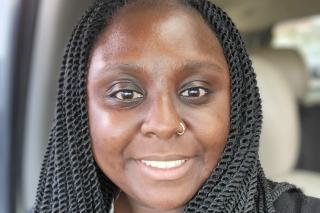What The Job Entails
Bianca Dunbar is a school-based social worker at UP Academy Dorchester, a Boston Public School serving PreK-8 students. As one of three social workers, she handles a caseload of 13 middle-school students who have individualized education plans (IEPs) designed to meet their learning needs and identify supportive services. She also leads several social skills groups, including self-esteem, personal boundaries, self-awareness, and communication styles. If a student is experiencing a mental health crisis, she and her team respond to complete a risk assessment and determine a plan of action. "We offer a multi-tiered system to address students' needs," she says. This approach, she explains, helps to "increase mental health awareness—both on an individual basis and through a social-emotional curriculum embedded in the school day."
Why She Chose Simmons
A graduate of Wheelock College with a degree in counseling psychology with a focus in juvenile justice and youth advocacy, Bianca hoped to gain advanced clinical skills to build on her undergraduate education. She believed that Simmons Social Work's comprehensive curriculum, as well as its professional partnerships in the community, would take her to the next level. "I was impressed with the Simmons mission and how the program supported its students," says Bianca.
How Simmons Prepared Her
Bianca entered Simmons with a focus on working with youth. What she didn't fully anticipate, she says, was how much the program would change her perspective. In particular, she points to how courses on race and identity pushed her "to be more open, self-aware, and knowledgeable about working in diverse environments." She adds that the "welcoming, come-as-you-are" atmosphere at Simmons helped to foster honest and engaging discussion. For her first placement, she worked with students at KIPP Academy, a charter school in Boston. In her second, she interned at YouthConnect, a partnership of the Boys & Girls Club that places clinical social workers in Boston Police departments to provide a number of services to at-risk youth referred to the program. In both positions, Bianca gained experience in clinical support, case management, and resource identification—skills that "aligned closely with my goals," she says.
Why it's Meaningful
"I went to Boston Public Schools and lived in neighborhoods that experience a lot of community violence," says Bianca. "I was fortunate to have different opportunities presented to me, to understand mental health and that my environmental circumstances don't define who I am. So I wanted to give back to my community, especially to schools serving predominantly Black and Brown individuals. It's important to me to break down the stigma and barriers around mental health and let youth know that you don't have to go through your struggles alone."

